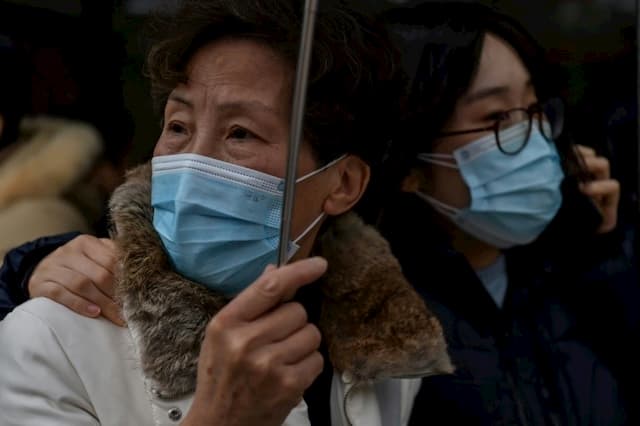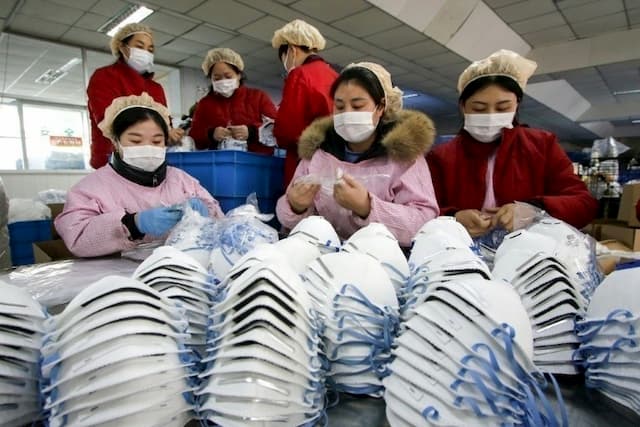Coronavirus: Facing the Epidemic, China Confines Entire Cities

The cities of Wuhan and Huanggang, respectively 11 and 7.5 million inhabitants, were placed in quarantine on Thursday 23rd January 2020. Beijing has cancelled the New Year festivities.
China confined Thursday, January 23, 2020 millions of inhabitants in two large cities including the metropolis of Wuhan from where a new virus has started which has started to spread around the world and mobilizes the international health authorities.
Since 10 am local time, no more trains or planes should in principle leave Wuhan, 11 million inhabitants, in the centre of China. The tolls at the city’s motorway exits are closed.
This metropolis on the banks of the Yangtze is at the heart of the epidemic which since December has infected more than 570 people and left 17 dead, according to the last report on Wednesday evening. All those who died in Wuhan or its region.
“The inhabitants must not leave Wuhan without a specific reason,” announced the headquarters responsible for combating the epidemic at the municipal level.
This decision is made to “effectively stop the spread of the virus,” he said, as China prepares to enter its long New Year’s holiday on Friday, which causes hundreds of millions of trips each year. .
The neighbouring city of Huanggang, 70 km to the east, with a population of 7.5 million, is subject to similar measures. Train traffic was to be stopped there until further notice from the end of the day.
Nearby, Ezhou (1.1 million inhabitants) has already closed its station.

New Years festivities cancelled
It was still possible to reach Wuhan by train or plane, even though many flights were cancelled.
But trains like planes were almost empty, a strange sight on the eve of the New Year’s holiday when they are usually taken by storm.
In the city centre, public transport was at a standstill and the New Years festivities were cancelled.
Almost all of the businesses, including cafes and restaurants, were closed. Scooter deliverers, usually ubiquitous in major Chinese cities, were absent subscribers.

In the rain, the city was plunged into surreal calm for a Chinese metropolis, usually brimming with life as the New Year approached.
Taxis have tripled their prices. “It is very dangerous to go out at the moment but we need money,” said a driver at AFP.
The town hall also imposed the wearing of a respiratory mask, which most of the inhabitants had in any case started to put on since the beginning of the week.
The fight began when a Chinese scientist admitted that the virus could be transmitted from human to human and not just from animal to human.
President Xi Jinping gave the signal for mobilization on Monday by calling for a “resolute” check on the epidemic, which until then had not made the headlines.
The city of Beijing has also decreed the cancellation of New Year’s festivities, which usually attract hundreds of thousands of onlookers in the parks to attend the traditional dance of the lion and the dragon.

WHO emergency meeting
In Geneva, the director of the World Health Organization (WHO), Tedros Adhanom Ghebreyesus, welcomed on Wednesday the “very, very strong” measures taken by China, believing that they would “reduce” the risks of spread outside of its borders.
They intervened when the WHO assembled its emergency committee to decide whether the new virus constitutes a “public health emergency of international concern”.
The experts have failed to agree on the issue, WHO was to continue the meeting Thursday from 11 a.m.
WHO has so far used the term international emergency only for rare cases of epidemics requiring a vigorous global response, including H1N1 swine flu in 2009, Zika virus in 2016 and Ebola fever, which has ravaged part of West Africa from 2014 to 2016 and the DRC since 2018.
Temperature controls at airports
The virus from the same family as SARS (Severe Acute Respiratory Syndrome), won several Asian countries and even the United States.
Body temperature controls have become widespread at several airports, including Dubai, one of the largest in the world, targeting all passengers from China, not just Wuhan.
At the gates of China, Hong Kong has transformed two summer camps into quarantine zones for people who may have been in contact with carriers of the virus.
The WHO had at the time of SARS, in 2002-2003, strongly criticized Beijing for having delayed raising the alarm and trying to conceal the extent of the epidemic.
SARS had killed 774 people worldwide, including 648 in China including Hong Kong.
The crisis has brought down the financial markets, in Asia as in Europe, for fear of a slowdown in China, the second-largest economy in the world. The Shanghai Stock Exchange lost nearly 3% and oil also lost ground.
Enjoyed this? Get the week’s top France stories
One email every Sunday. Unsubscribe anytime.


